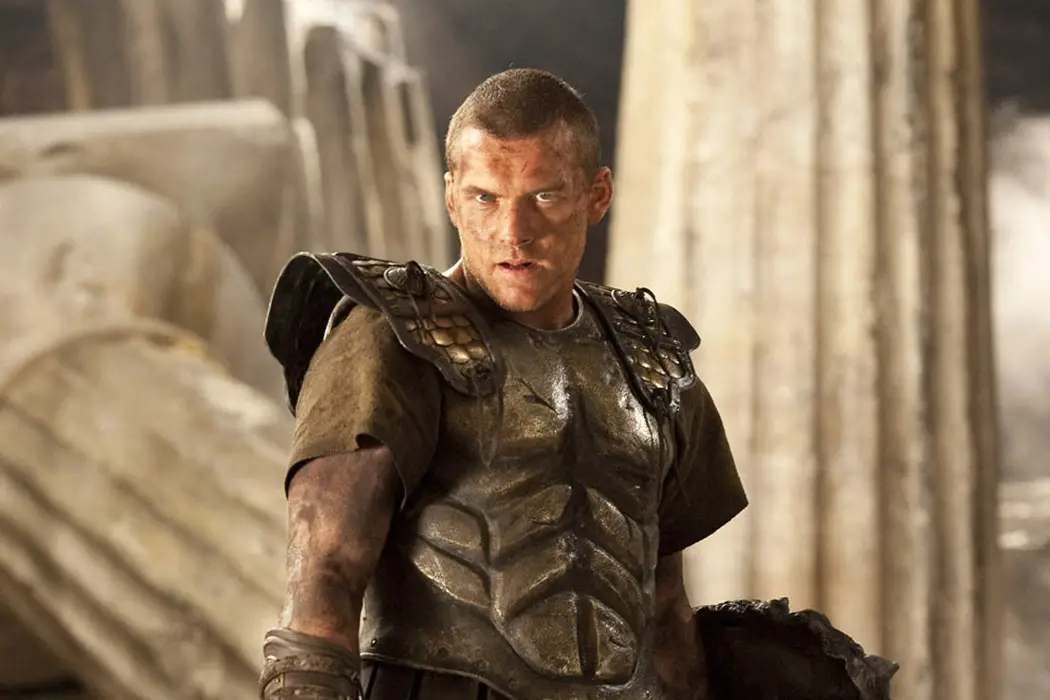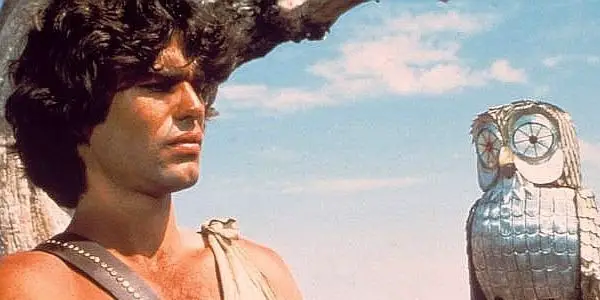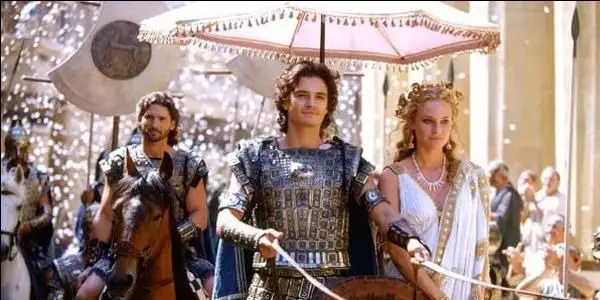Your Achilles’ Heel: Ancient Greece & The Movies

Katy Kostakis’ loquacious nature and a lifelong love of performing…
Ancient civilizations and mythology have always been a source of traditional educational fare in both high school and college curriculums worldwide. Hollywood has never been timid when it comes to adapting not only the recorded history of an empire, but the works passed down through oral traditions, as well as of some of their greatest authors and philosophers.
Ask anyone of Greek descent (myself included) and most will firmly assert that the diaspora has always been quite territorial of their stories; assuredly vocal about their high (and, truthfully, sometimes lofty) expectations for any type of film that portrays its rich culture.
Fairly often, the cinematic depictions of these tales of warriors and monsters, gods and mortals that are shaped in both fantasy and reality lose more than a bit of the translation from the page to the screen. While some of these works embraced the spirit of the Hellenic sagas, others crashed and burned faster than Icarus and his wax wings.
Take a trip with me thousands of years back in time to Ancient Greece, where Hercules, Hades, Athena and Aphrodite reigned supreme; where the words of Homer, Euripides, Plato and Sophocles mesmerized the masses.
Daddy, Daddy, If You Could Only See…
For many children of the ‘80s, 1981’s Clash of the Titans was their first cinematic foray into the tale of demigod and son of Zeus, Perseus, leaving his homeland of Seriphos to defeat the snake-haired Gorgon Medusa and rescue the beautiful Andromeda. Harry Hamlin was something of an unknown at the time, having done some theatre, a couple of television shows and one other film before being cast as the lead. This film boasted quite a supporting cast, including Maggie Smith, Ursula Andress, Judi Bowker, and Laurence Olivier.

Directed by Desmond Davis, Clash of the Titans got a mixed bag of reviews, but with Ray Harryhausen’s stop motion animation of various creatures well known throughout the Greek pantheon, Hamlin’s rugged good looks lending to a decent performance, as well as beautiful scenes shot in Europe, it forever remains a classic. Action packed and rich with effects, no list of fantasy films would be complete without it. A remake was released in 2010 with Sam Worthington and Liam Neeson, followed by a sequel, 2012’s Wrath of the Titans.
If you do not know all the key players involved in the events leading up to the Trojan War, the name Iphigenia may not sound familiar to you, but the tale of the doomed daughter of Agamemnon and Clytemnestra was brought to life in 1977 thanks to director Michael Cacoyiannis. This was the last of the three films Cacoyiannis adapted from the plays by Euripides, which starred some of the most beloved and well-respected actors in Greece.
King Agamemnon (Kostas Kazakos) and his brother Menelaus are preparing to gather their ships to sail over to Troy to retrieve Menelaus’ wayward wife, Helen. However, their plans are thwarted when in a fray involving his troops, an animal sacred to the goddess Artemis has been killed. Deeply offended, she has held the winds and will only release them if Agamemnon’s eldest daughter, Iphigenia (Tatiana Papamoschou) is sacrificed. As his army gets more and more restless waiting to set sail, a heartbroken and anguished Agamemnon must concoct a scheme to bring reinforcements to the army, by telling his wife (and Helen’s sister) Clytemnestra (Irene Papas) that he plans to wed their child to the famous warrior Achilles (Panos Mihalopoulos).
When the deception is fully uncovered, each one of them faces pain, suffering, betrayal and ultimately, heartbreak. A teenager herself when filming, Papamoschou’s childlike performance fed off of that innocence and youth and stretched her range from anger to disbelief to sadness, all which led to her character’s acceptance of her fate.
Undoubtedly the actor that would achieve the most acclaim internationally, Irene Papas, worked multiple times with Cacoyiannis, playing another of Clytemnestra and Agamemnon’s daughters fifteen years prior in Electra, as well as Helen of Troy in 1971’s The Trojan Women. Some of her most well known roles outside of Greece were as Maria in The Guns of Navarone, Katherine of Aragon in Anne of The Thousand Days, and of a Cretan widow in Zorba the Greek.
Nominated for an Academy Award for Best Foreign Film, and possibly the least known movie on this list, Iphigenia never attempted to overinflate its production value, glamorize the content or make it more “Hollywood”, as Greece was still recovering from several turbulent years under the rule of a military junta, followed by the ousting of the country’s monarchy. There was a natural, realistic style in its acting, cinematography, and music that could have very well been the method that the plays were staged over 2000 years ago in amphitheatres across that country.
Once Artemis was appeased, the winds started back up again, and it was time to jump 27 years later to… Troy.
War. What Is It Good For?
The Trojan War got the full on Hollywood treatment back in 2004 with Troy. This time, a very blonde, tanned, and muscular Brad Pitt took up the helm as Achilles and was joined by a who’s who list of major talent, including Orlando Bloom, Eric Bana, Diane Kruger, Peter O’Toole and Rose Byrne.

Bloom was coming off his huge success in the Lord of the Rings trilogy, as well as a leading role in Pirates of The Caribbean: The Curse of the Black Pearl, therefore he was attempting to expand his acting range in his portrayal of one of the famed princes of Troy, Paris. While his portrayal of Will Turner in the Pirates franchise had been widely embraced, his interpretation of this part did not fare as well. Paris was known for his strength and fighting prowess, but Bloom’s version came off as whiny and obnoxious, which was truly disappointing: the antithesis of the literary character. In addition, the romance between Paris and the woman whose face launched a thousand ships lacked any emotional depth or spark and was simply not believable.
Visually, everything was brightly colored, rich and sumptuous, but too much of the story was diluted or diverted to make this script, and, in turn, this production more palatable. Like his brother, Hector was a formidable fighter and Eric Bana succeeded in capturing that essence, as did Pitt.
A notable demotion of a very prominent and important figure in this tale is that of Cassandra, the daughter of Priam and sister to Hector and Paris. In mythology, after fending off the advances of the god Apollo, he cursed Cassandra with the gift of prophecy, but stressed that no one would believe her rants. She prophesied that her people would be embroiled in a great battle and would suffer greatly, and that absolutely happened. Despite the rather wooden performances and deviation from the story, Troy did extremely well at the box office, but as for the rest of the legend, there was no happy ending. The defeated Trojans were taken into enslavement and brought to Greece, Helen returned to Menelaus, and Clytemnestra would get the ultimate revenge on her husband for the deception that led to a full on battle.
That same year, history and military buffs were more than excited for Oliver Stone’s biopic of, by and large, the most beloved and respected historical figure in Greece, Alexander the Great. Only, no one thought this film was so great. Clocking in at just under 3 hours, and starring Colin Farrell as the famed world conqueror, there were plenty of objections, outrage, and outcries to this movie. Among them was Angelina Jolie’s lackluster performance as Alexander’s mother, Olympias, sporting an accent that sounded more Russian or Slavic than Greek.
One of the biggest faux pas made by Stone, as it was said, was how the film focused too much on the possible romantic love between Alexander and Hephaiston (Jared Leto). It was said that the Greeks were upset overall about this particular portrayal of Alexander; casting aside the feasible and documented accounts that both homosexuality and bisexuality were widespread, accepted, and common in ancient times.
In my only viewing during its theatrical release, I was disappointed that so much was focused on his personal life and less on the astonishing accomplishments he made in such a short period of time. If Oliver Stone put his focus into that area and executed it that way, I firmly believe this movie would have been better received. It bears repeating that one of Alexander’s generals, Ptolemy, was given territory that included Egypt, thus beginning the line of pharaohs that trickled down to the penultimate queen and femme fatale, Cleopatra.

A few years later, another famed Hellenic warrior king was brought to the big screen in 300, this time in a style never seen before. Frank Miller’s graphic novel depicting the famed Battle of Thermopylae hit the cinemas, and completely transformed and transcended how other historical films were made. Shot entirely over green screen, this runaway hit starred Gerard Butler as Spartan king Leonidas, who led his small, yet fierce army of soldiers (including Michael Fassbender and David Wenham) to battle the forces of Persian god-king Xerxes (Rodrigo Santoro).
With fast-paced action, quick cuts, and bursts of bright reds slashed over muted tones, this was stylistically nothing like the sword and sandal epics that moviegoers were used to. The script showed the heart, soul, and mettle of the Spartan warriors, with the lines often quoted by other films and the public at large. While it may take convincing, I believe everyone, not just those with Spartan heritage, can appreciate and embrace how these soldiers were portrayed. However you can’t win them all, as its sequel, 300: Rise of an Empire (which starred Sullivan Stapleton and Eva Green) didn’t get as much critical respect as its predecessor.
The Show Must Go On!
Whenever anything with a historical or mythological basis is adapted, naturally there will be some artistic license taken. The mission may be to introduce these millennia-old stories to new audiences, yet my fervent hope is that as the entertainment industry continues to grow and embrace new styles and new forms of media, they try to stay as faithful as possible to the original material.
I would love to see adaptations of Medea, the vengeful wife of Jason, Lord Byron’s involvement in the Greek War of Independence in 1821, or of Oedipus, the Theban king who tried to avoid his tragic destiny, but ultimately fulfilled it. It’s a matter of time before these become a reality, and, ideally, they will be done with the utmost care and reverence.
What films would you want to be redone? What Greek mythological or historical stories would you like to see made into a major picture? What films do you believe best told these ancient stories?
Does content like this matter to you?
Become a Member and support film journalism. Unlock access to all of Film Inquiry`s great articles. Join a community of like-minded readers who are passionate about cinema - get access to our private members Network, give back to independent filmmakers, and more.
Katy Kostakis’ loquacious nature and a lifelong love of performing led to her training for a broadcast career, yet her distinctive voice and style, with its conversational and highly descriptive tone, helped her to find her calling in written media. That love of words has produced a vast body of work, so when she isn’t working, writing, or talking everyone’s ears off, Katy enjoys ‘80s, rock, techno, and industrial music, the films of Alfred Hitchcock, art museums, Renaissance and Medieval history, and Britcoms. To view her work, please visit her website at katykostakis.com and follow her on Twitter: @KatyKostakis.













